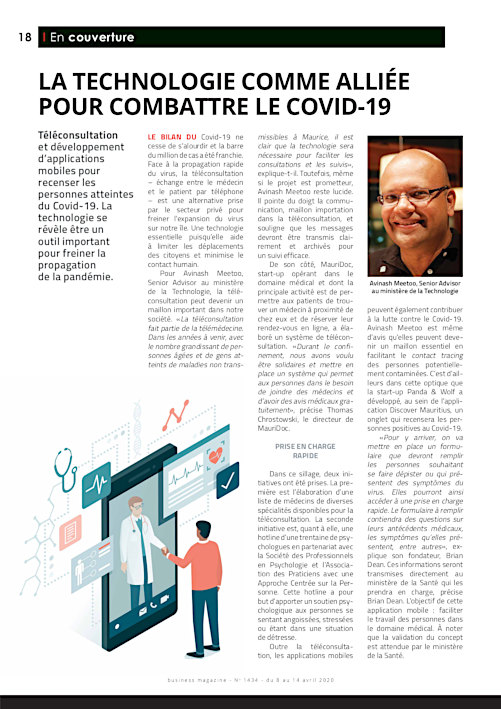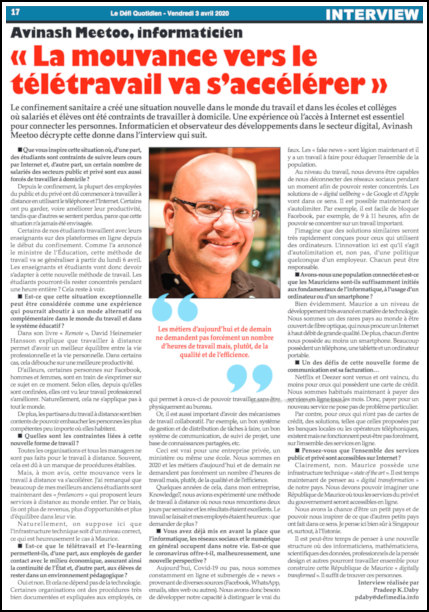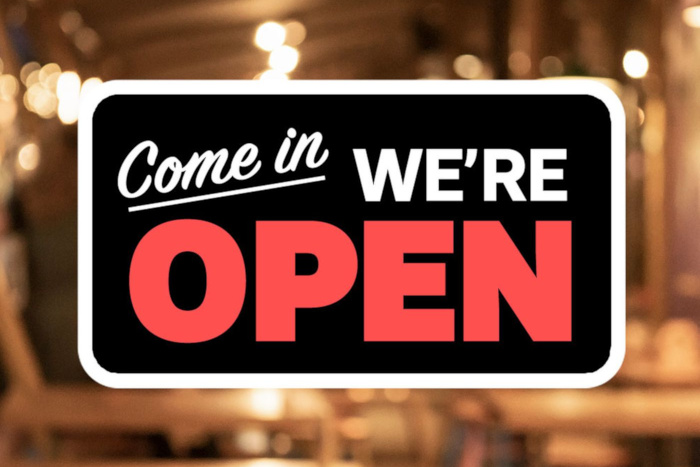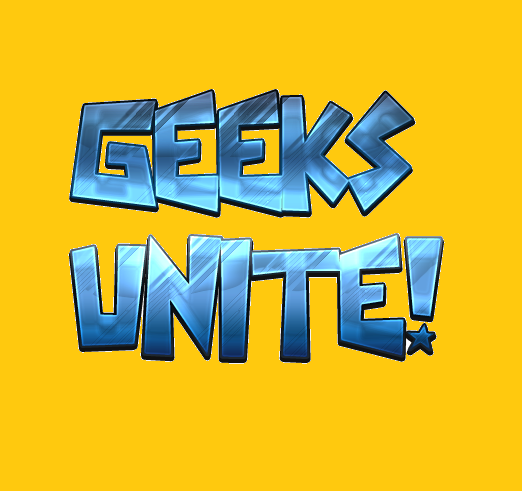
Cette semaine, à la page 18 de l’édition 1434 de Business Mag, je donne mon opinion sur comment la technologie peut être une alliée pour combattre le COVID-19. Pour des raisons que je ne pas sûr de bien comprendre, mes propos ont été tronqués. Voici la version intégrale.
(1) Avec le nouveau coronavirus, la téléconsultation est-elle une solution afin de mieux contrôler sa propagation? Envisagez-vous d’implémenter l’utilisation des appels vidéos dans ce cadre dans le futur?
Tout d’abord, je suis informaticien et non pas médecin. Mon opinion est celui de quelqu’un qui maîtrise les aspects technologiques mais je ne prétends pas avoir la moindre notion dans le domaine médical.
Ceci étant dit, la téléconsultation forme partie de la télémédecine et, dans les années à venir, avec le nombre grandissant de personnes âgées et de personnes ayant des maladies non-transmissibles à Maurice, il est clair que l’apport de la technologie sera nécessaire pour faciliter les consultations et les suivis.
(2) Selon vous, la téléconsultation est-elle plus efficace qu’une consultation physique?
Je ne suis pas médecin et je ne peux juger de l’efficacité d’une téléconsultation. Cette solution, qui relève de la technique, nécessite bien évidemment d’être évaluée par la profession médicale et, si cette évaluation est concluante, alors je ne vois pas pourquoi elle ne pourrait pas devenir plus présente dans notre pratique médicale.
(3) Comment la technologie peut-elle aider le secteur médical dans le sillage du COVID-19?
En premier lieu, il est nécessaire, en période de crise, d’avoir des outils de communication adaptés. Je pense ici à la communication instantanée. Aujourd’hui, nous utilisons énormément WhatsApp et les emails mais il est clair que les groupes, bien qu’utiles, ne sont pas idéaux lorsque le nombre de participants est grand. De plus, il est difficile de retrouver une information. Il existe des outils plus avancés pour pouvoir travailler et communiquer de manière collaborative et ayant de formidables moyens d’archivage et de recherche. Certains de ces outils sont gratuits. La technologie peut aussi aider pour les bases de connaissance (« knowledge base »). Nos équipes médicales doivent constamment avoir accès à des informations précises sur la maladie. Il est facile d’envisager une forme de Wikipedia privé où cette information serait stockée et constamment mise à jour.
Un autre outil qui peut être vraiment utile est une application mobile pouvant servir à faire du « contact tracing ». Imaginez la situation suivante. Monsieur X a installé cette application sur son smartphone. Madame Y s’approche (je suppose ici qu’elle a la même application). Les deux applications mobiles se parlent (en utilisant, par exemple, le protocole Bluetooth) et chacune mémorise que ces deux personnes se sont approchées.
Quelques jours après, Monsieur X tombe malade. Les autorités peuvent accéder à la liste des personnes l’ayant approché et là, en découvrant Madame Y, peuvent rapidement aller vers elle pour effectuer des tests.
Ce genre de système est utilisé à Singapore par exemple et le gouvernement singapourien a annoncé qu’il offrira l’application mobile (Bluetrace.io) gratuitement et selon le modèle du logiciel libre à tous les pays. Dès que cela arrivera, les informaticiens de Maurice devront se mobiliser pour adapter cette application au contexte local.
(4) Selon vous, les Mauriciens sont-ils prêts pour l’ère numérique?
Oui, tout simplement parce qu’ils ont compris que la technologie peut aider à divers titres et sur le court-terme, le moyen et le long-terme.
Par exemple, nous sommes, en ce moment, en confinement et nous devons pouvoir quand même nous nourrir. Nous avons fait une proposition pour avoir un site web de réservation de place pour les supermarchés. Notre intention est de limiter le nombre de personnes autour et dans les supermarchés.
D’ailleurs, de par la taille du pays, il est concevable d’avoir à terme à Maurice un service de livraison pouvant tout livrer à un prix minime. Imaginez ce que ce service de « home delivery » aurait pu apporter en ces moments de confinement ? Les boutiques, boulangeries et même les supermarchés auraient pu faire leurs livraisons. Plus besoin pour nous de nous déplacer pour avoir notre pain. Nous pouvons même imaginer ce service comme une plateforme nationale où tous les produits disponibles à Maurice seraient listés. Faire ses courses ou acheter un cadeau d’anniversaire deviendraient un jeu d’enfant…
La technologie peut aussi beaucoup apporter au niveau de la communication et du travail à distance. Le confinement nous a fait réaliser qu’une visioconférence peut être toute aussi efficace qu’une réunion en face à face. De même, pour certains, travailler quelques heures à la maison, tout en vaquant à ses occupations personnelles, n’a pas d’impact négatif sur la productivité. La technologie peut aider en proposant des solutions de gestion de projet, d’allocation de tâches à faire, de suivi, de contrôle, etc.
Il est clair que les technologies de l’information et de la communication ont changé le monde. Et, aujourd’hui, dans une certaine mesure, à cause du coronavirus, elles sont en train de changer notre conception de la vie professionnelle. Je ne sais pas si nous serons intéressés de repartir au boulot de 9:00 à 16:00 (dans le meilleur des cas) et de passer des heures dans les embouteillages après cette pandémie…
(5) Pourrais-je avoir votre déclaration par rapport à l’application BeSafe Moris? Pourquoi avoir développé cette application?
L’application BeSafe Moris a été créée par l’équipe d’innovation de Mauritius Telecom. Elle permet d’obtenir les dernières statistiques et l’ensemble des communiqués officiels. Elle donne aussi les coordonnées de tous les services de santé. Elle est très régulièrement mise à jour.
Elle a été lancée officiellement par le Ministre de la Technologie de l’Information, de la Communication et de l’Innovation le 26 mars.
(6) Comment voyez-vous l’adoption de la technologie dans diverses secteurs à Maurice, dans les années à venir et comment vous y préparez-vous?
Aujourd’hui, Maurice possède une infrastructure technique de très haut niveau avec de la fibre optique déployée partout dans l’île et Internet à très haut débit.
Nous avons quelques services en ligne qui fonctionnent correctement aussi bien au niveau du gouvernement (e.g. la MRA) et du privé (quelques sites de réservation d’hôtel et de commerce en ligne). Mais il est clair que, par rapport à notre infrastructure, nous sommes en retard en terme de services en ligne. Pour un petit pays comme Maurice, tout aurait dû, et aurait pu, être en ligne.
Notre pays doit maintenant passer par une phase de « digital transformation ». Tout doit se numériser. Heureusement, il n’est pas nécessaire de réinventer la roue. Inspirons-nous de Singapour et, surtout, de l’Estonie. Créons une structure composée d’informaticiens, de mathématiciens, de « data scientists » et d’autres professionnels pour construire la République de Maurice de demain. Ces personnes se connaissent. Il suffit de les fédérer et de leur donner des moyens.
(7) Champ libre si vous souhaitez mentionner un élément/ événement supplémentaire.
Les métiers du futur sont majoritairement des métiers technologiques. Ces nouveaux métiers nécessitent un bon niveau en mathématiques, en informatique et en sciences. Je conseille donc à nos jeunes de bien choisir les matières à l’école. Le Ministère de l’Éducation et celui de la Technologie ont un rôle clé à jouer dans la création d’une nouvelle génération de Mauriciens pouvant faire progresser notre pays.





